Online CACFP Training
Powered by Bright Track
24/7 Access
Complete your online training 24/7. Training is self-directed.
Earn Certificates
Earn a certificate of training for completing your required annual CACFP training.
Any Location
Complete your training from any location. All you need is Internet access.
Online Course Catalog
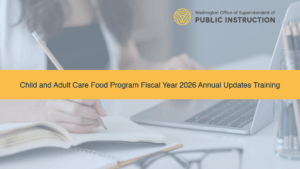
CACFP Fiscal Year 2026 Annual Updates Training (OSPI-5001)
This comprehensive annual training is designed to prepare Child and Adult Care Food Program (CACFP) sponsors for Fiscal Year 2026 operations. Participants will receive essential updates on USDA policy memos and guidance released during FY2025, as well as important program updates and reminders from Washington’s Office of Superintendent of Public Instruction (OSPI). The course will also review the administrative review process, outline key steps for the FY2026 application renewal, and provide guidance on USDA Foods and Farm to CACFP initiatives. Attendees will leave with up-to-date resources to support successful program implementation and compliance in the coming year.
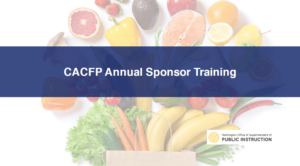
CACFP Annual Sponsor Training for Centers 2025-2026 (OSPI-110)
The CACFP Annual Sponsor Training is a 4 hour comprehensive online course designed to provide annual required training for returning CACFP sponsors. The training includes important topics such as Civil Rights, Performance Standards, Meal Service Planning, Recordkeeping, Financial Management/Maintaining a Nonprofit Food Service and Program Oversight/Serious Deficiency Process.
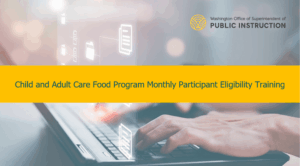
The Office of Superintendent of Public Instruction Child and Adult Care Food Program Monthly Participant Eligibility Training 2025-2026 (OSPI-5002)
This course will guide participants through the essential steps of monthly eligibility reporting in the Child and Adult Care Food Program (CACFP). Learners will explore how to accurately manage Enrollment or Income Eligibility Applications (EIEAs), maintain the Participant Eligibility Roster, and report eligibility in the WINS system. By the end of the lesson, you’ll be equipped with the tools and knowledge to ensure accurate eligibility documentation and maximize your program’s reimbursement.

Menu Building Basics: Utilizing CN Labels and USDA Recipes to Build a Cycle Menu (OSPI-522)
In this course, participants will learn to recognize the 6 key indicators for a CN Label is, what a product formulation statement is, and how to use them to build a cycle menu. In addition, participants will explore the vast resources of USDA Standardized recipes, and will learn how to scale these recipes and products to fit their production needs. Lastly, participants will understand the basics of record retention and what documentation would be needed to support food production records, if required by their state.
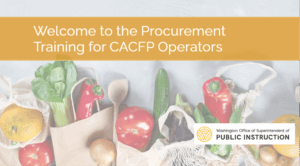
Procurement for CACFP Operators 2025-2026 (OSPI-181)
All CACFP operators must procure all goods and services through competitive practices while following all applicable federal regulations as set forth in Title 2, Code of Federal Regulations (2 CFR), sections 200.318–326 and Title 7, Code of Federal Regulations (7 CFR), sections 226.6(i), 226.21 and 226.22. This course will define procurement and will provide an overview of the types of procurement methods, strategies for local purchasing, and purchasing from a Food Service Management Company. Lastly, participants will understand the federal requirement that all CACFP Operators must develop and maintain two procurement documents: Written procurement procedures and a written code of conduct.
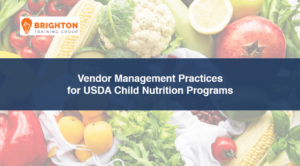
Vendor Management Practices (OSPI-563)
The course will help you understand basic procurement standards and the importance of vendor selection when outsourcing the food program. It will cover identifying and evaluating vendors based on quality, pricing and reliability. Managing the vendor contract to ensure the quality and safety of the food program will also be reviewed.
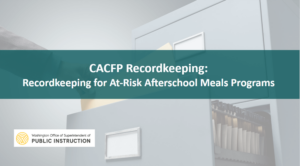
General Recordkeeping and At-Risk Afterschool Meals Program Recordkeeping 2025-2026 (OSPI-612)
This course focuses on general CACFP recordkeeping requirements in lesson 1. In lesson 2, recordkeeping for At-Risk Afterschool Meals Programs is discussed more specifically. The course addresses program eligibility, operational requirements, enrollment, participant eligibility, and miscellaneous recordkeeping requirements.
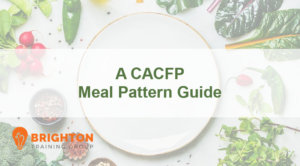
Creditable vs Non-Creditable: A CACFP Meal Pattern Guide (OSPI-505)
One of the hardest parts of planning a CACFP menu is understanding if a food is creditable or not and how much you need to serve. In this brief overview, participants will learn about tools to guide them to determine if a food is creditable to the CACFP meal pattern, and how much they need to serve to be in compliance.
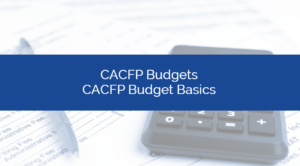
CACFP Budgets (CORE-870)
This course will discuss the importance of the CACFP budget and how it relates to the management plan and the CACFP performance standards. Participants will obtain an overview of the federal cost principles and how they relate to the CACFP budget. Participants will also learn the key steps for creating a CACFP budget and receive best practices for developing and monitoring a CACFP budget.

Monitoring and Oversight (CORE-810)
“Monitoring & Oversight” will provide an overview of the federal CACFP monitoring requirements for sponsoring organizations. Participants will learn the purpose and importance of monitoring, the federally required monitoring review elements, and best practices for conducting monitoring reviews.
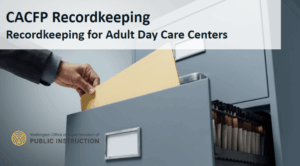
Adult Day Care Recordkeeping 2025-2026 (OSPI-615)
This course focuses on CACFP recordkeeping requirements for Adult Day Care programs. The course addresses program eligibility, operational requirements, enrollment, participant eligibility, meal pattern flexibilities, and miscellaneous recordkeeping requirements.

Serious Deficiency (CORE-820)
“Serious Deficiency” will provide an overview of the CACFP serious deficiency process for day care home providers. Participants will learn the purpose of the serious deficiency process and the six steps of the serious deficiency process. Sponsoring organizations will also learn best practices for implementing the serious deficiency process for day care home providers.
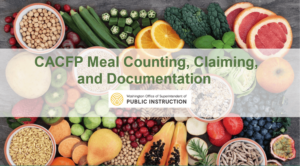
Meal Counting, Claiming and Documentation 2025-2026 (OSPI-604)
Submitting a claim for CACFP reimbursement requires detailed recordkeeping and preparation prior to the submission. This course reviews requirements related to point of service meal counts, attendance documentation, the edit check process, consolidation, and claim submission.
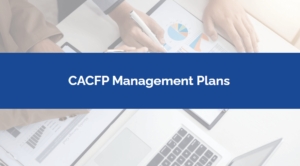
Management Plans (CORE-840)
This course will discuss the definition, purpose and components of a management plan. Participants will learn how to evaluate, monitor, revise and submit the management plan. Participants will also discuss the CACFP performance standard and share best practices.

Sponsor Monitoring 2025-2026 (OSPI-609)
This course reviews monitoring requirements, staffing, completing monitoring reports, and conducting the five-day reconciliation.
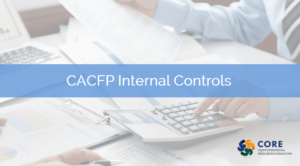
Internal Controls (CORE-850)
In this course, participants will learn the purposes, components and principles of internal controls. Participants will demonstrate how to document, assess and monitor internal controls as well as identify common program areas where internal controls are essential.
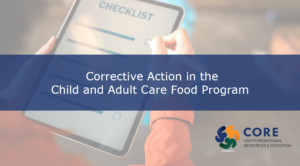
Corrective Action in the CACFP (CORE-860)
In this course, participants will learn about the purpose of corrective action and why corrective actions are necessary. Participants will learn how to analyze the root cause of noncompliance and explain the relationship between corrective action and a corrective action plan (CAP). In addition, this course will cover the components of a CAP and how to evaluate the effectiveness of a CAP.

Diversifying Meals in Child Nutrition Programs (OSPI-570)
Multicultural Menus: Diversifying Meals in Child Nutrition Programs is a 1-hour training course designed to provide Child Nutrition Program operators with the skills they need to incorporate regionally diverse meals into their program. This training covers important topics including the importance of providing multicultural meals, methods of implementing a taste test, and ways to adapt menus to provide a range of multicultural dishes.
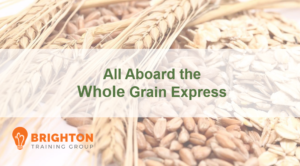
All Aboard The Whole Grain Express! (OSPI-515)
With a destination of great nutrition and better lifestyles, learning how to incorporate whole grains into your CACFP menu can be a journey. In this one-hour session, participants will punch their ticket and board the whole grain express train, learning about where whole grains come from, how to incorporate them into their menu, and best practices for the preparation methods.
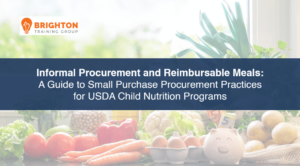
Informal Procurement and Reimbursable Meals: A Guide for Small Purchases (OSPI-562)
All Child Nutrition program operators must procure all goods and services using the federal procurement regulations. This course will define informal procurement thresholds, and the main steps involved in procuring food. It will offer practical strategies for purchasing, and provide resources to ensure that the meals served to program participants are reimbursable.

Navigating Special Dietary Needs (OSPI-512)
CACFP sponsors may need to modify planned meals in order to accommodate participants with disabilities, medical needs or special dietary needs. The course summarizes the responsibilities sponsors have when accommodating participants’ meal requests. The course also discusses medical statements, meal pattern requirements, and accommodating non-disabling special dietary needs.
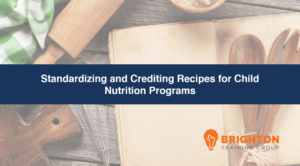
Standardizing and Crediting Recipes for Child Nutrition Programs (OSPI-324)
This course is designed to elaborate on standardizing and crediting recipes for child nutrition professionals. It provides an overview of standardized recipes, the steps to develop a standardized recipe, and an explanation of how to credit standardized recipes. Participants will understand the key elements of standardizing recipes and the benefits to using them in their child nutrition program.
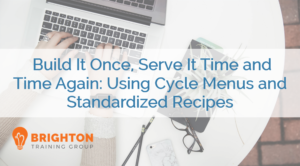
Build It Once; Serve It Time and Time Again: Using Cycle Menus and Standardized Recipes (OSPI-504)
How important is menu planning to a meal program? The menu plan influences every aspect of the meal program – including purchasing and preparing foods, ensuring that your meals are CACFP creditable, providing adequate nutritional value, accounting for dietary restrictions, and satisfying the tastebuds of the children in your care. In this one hour session, participants will learn about standardized recipes, cycle menus and the benefits of using both of these great tools to maximize kitchen efficiency and food budgets.
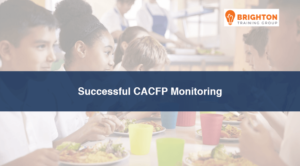
Successful Monitoring (OSPI-585)
This course will give CACFP sponsor monitors an outline of their responsibilities for conducting successful reviews of centers or family day care homes. They will better understand the requirements for reviews and how to assess compliance with USDA regulations. Finally, they will be able to recognize problems that would result in review findings.
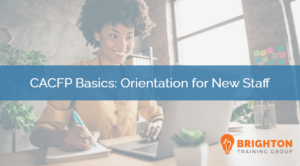
CACFP Basics: Orientation for New Staff (OSPI-557)
Do you wonder how CACFP benefits the participants in your organization? Are you unfamiliar with the goal of CACFP? Are you wondering what CACFP even means? Then this is the course for you! Over the next hour, we will dig into the basics of the Child and Adult Care Food Program and how it supports children and adults each and every day.
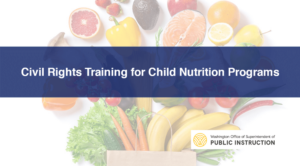
Civil Rights Training 2025-2026 (OSPI-150)
Program institutions and facilities receiving federal financial assistance are required to comply with federal civil rights laws to ensure all Child Nutrition participants have equal access to all benefits and services. This course will review Civil Rights regulations, and provide all information necessary to ensure that your program is in compliance with these requirements.
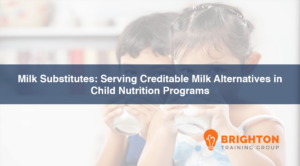
Milk Substitutions: Serving Creditable Milk Alternatives in Child Nutrition Programs (OSPI-571)
This is a 1-hour training course designed to provide child nutrition program operators with the information they need to accommodate participants’ dietary needs as it pertains to fluid milk consumption. This training covers important topics including creditable milk types per age group and meal service, methods for accommodating special dietary requests and disabilities, and allowable fluid milk substitutions.
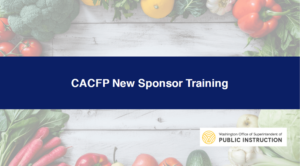
CACFP New Sponsor Training 2025-2026 (OSPI-120)
The CACFP New Sponsor Training is designed to provide initial training for those who are new to the CACFP or for participating sponsors with new staff. The training includes important topics such as Civil Rights, Meal Service Planning, Recordkeeping, Financial Management, Documentation, and Responsibilities, Maintaining a Nonprofit Food Service Program and Program Oversight.
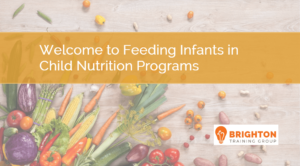
Feeding Infants in Child Nutrition Programs (OSPI-583)
This course will examine the growth and development of infants and how to make healthy food choices for infants to support this development. We will review breastfeeding, bottle feeding and introduction to solid foods. Participants will be able to select healthy menus and understand the CACFP meal patterns for infants.

VCA and Internal Controls: Evaluating Compliance with the Performance Standards 2025-2026 (OSPI-131)
To protect the integrity of the Child and Adult Care Food Program (CACFP), 7 CFR 226, the CACFP Regulations, require the state agency to develop factors for all new and participating institutions to determine their compliance with the Performance Standards, also called VCA: Viability, Capability, and Accountability. VCA and Internal Controls: Evaluating Compliance with the Performance Standards assists institutions in making this determination by providing guidelines for institutions to identify the documentation necessary to demonstrate their on-going compliance. The course will also discuss ways for institutions to adopt internal controls that will allow them to maintain and improve VCA.
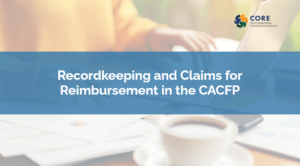
Recordkeeping and Claims for Reimbursement in the CACFP (CORE-830)
This course will review CACFP recordkeeping requirements and explain how maintaining records relate to the submission of an accurate claim for reimbursement. Participants will identify common CACFP records and discuss frequent issues associated with recordkeeping and management practices that adversely impact claims for reimbursement. Participants will learn the CACFP edit check requirements and discuss best practices for submission of a claim for reimbursement.
